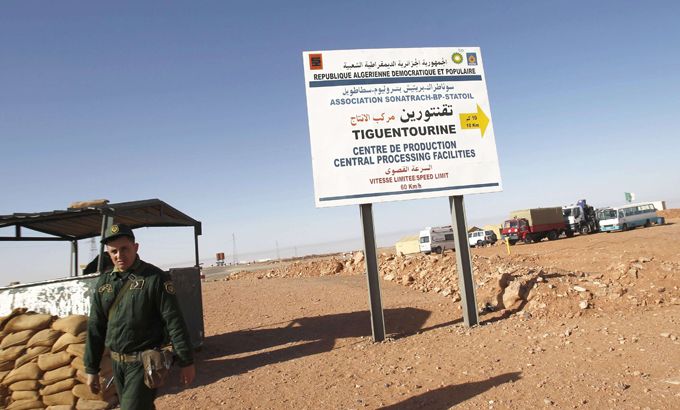Storming of Algerian gas plant claims lives
Reports say seven hostages among the dead as special forces raid installation in the desert to end hostage crisis.

At least seven captives are reported to have been killed and 16 foreign hostages freed after the Algerian military stormed a gas installation in the desert where they were being held by al-Qaeda-linked fighters.
Eleven of the fighters were also klilled in Saturday’s raid, according to the Algerian state news agency.
Those freed included two Americans, two Germans and one Portuguese, sources told Reuters news agency.
The nationalities of the others were not immediately clear.
The fighters had said they were still holding seven foreign hostages at the gas plant, and that their demands of an end to the French military intervention in Mali the release of prisoners remain unchanged.
Earlier on Saturday a spokesman for the group known as Signatories in Blood told Al Jazeera that they were still open to negotiations regarding a prisoner swap with the Algerian military, after earlier negotiations broke down and led to an Algerian security services assault on the facility.
The burned bodies of 15 people were found at the site of the gas field on Saturday, but their identities were not clear.
An American citizen was confirmed dead early on Saturday, but uncertainty remains over the fate of other foreigners held at the plant.
“This is an extremely difficult and dangerous situation,” Hillary Clinton, the US secretary of state, said in Washington at a joint news conference with Fumio Kishida, Japan’s foreign minister.
The US state department identified the dead US citizen as Frederick Buttaccio.
Leon Panetta, the US defence secretary, said on Saturday the US would “take all necessary steps to protect our people” from the threat posed by al-Qaeda linked fighters in North Africa.
Officials say at least 30 more people remain unaccounted for, and the fate of at least 10 Japanese nationals and six Norwegian hostages is still unknown.
France on Saturday said no more of its nationals were beind held. Defence Minister Jean-Yves Le Drian confirmed that one Frenchman had been killed in the attack and that other French nationals taken hostage had been freed.
Vienna said one Austrian had been released. Romania confirmed that three of its nationals who were being held were now free. At least two Filipino workers were also able to escape. Two Norwegians have also been found alive, said the Norwegian oil company Statoil, which manages the plant.
Workers remain
International criticism of the haste with which Algeria launched a dramatic military assault to rescue those held has been mounting, after an Algerian security official said and earlier assault had left 12 hostages and 18 kidnappers dead.
A US official said an American military transport plane had begun to help evacuate survivors, but gave no estimate of the number of US hostages.
|
Interview: Algeria gas worker recounts hostage drama |
Troops were trying to reach a “peaceful” end to the hostage crisis, before “neutralising the terrorist group that is holed up in the plant and freeing a group of hostages still being held there”, a security official said.
Algerian news agency APS quoted a government official as saying the kidnappers, who claimed to have come from Niger, were heavily armed with machine guns, assault rifles, rocket launchers and missiles.
Some of those who escaped said explosives had been wrapped around their necks and others said they hid, petrified, wherever they could.
Algerian forces launched their rescue bid on Thursday, a day after kidnappers seized the plant to avenge what they said was Algiers’ support for French military action in neighbouring Mali.
David Cameron, the British prime minister said he was “disappointed” not to have been told in advance about the rescue bid at the field, operated jointly by British energy giant BP, Norway’s Statoil and Sonatrach of Algeria.
Speaking to Al Jazeera, Mahjoob Zweiri, a professor of contemporary history of the Middle East at Qatar University, said that there is a “security vacuum” in the region.
“This crisis is not an internal crisis. This is a regional crisis, because this has a strong link with what happened in Mali, this has a strong link with what was happening in Tunisia and Libya […] because of that, I mentioned a security vacuum,” he said.